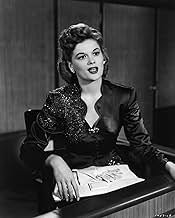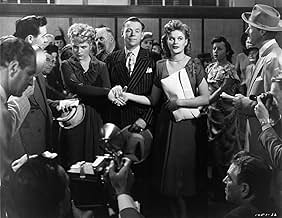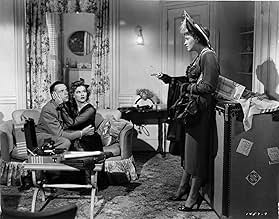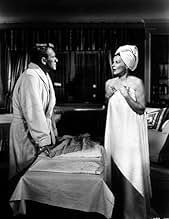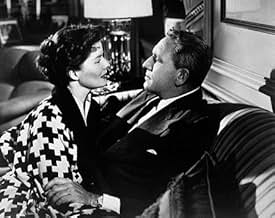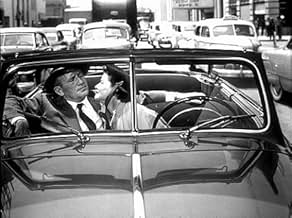ÉVALUATION IMDb
7,4/10
23 k
MA NOTE
Les tensions domestiques et professionnelles s'intensifient lorsqu'un mari et sa femme travaillent comme avocats opposés dans une affaire impliquant une femme qui a tiré sur son mari.Les tensions domestiques et professionnelles s'intensifient lorsqu'un mari et sa femme travaillent comme avocats opposés dans une affaire impliquant une femme qui a tiré sur son mari.Les tensions domestiques et professionnelles s'intensifient lorsqu'un mari et sa femme travaillent comme avocats opposés dans une affaire impliquant une femme qui a tiré sur son mari.
- Nommé pour 1 oscar
- 1 victoire et 4 nominations au total
Edward Andrews
- Kip's neighbor
- (uncredited)
Bonnie Bannon
- Woman in Courtroom
- (uncredited)
Charles Bastin
- Young District Attorney
- (uncredited)
Harry Baum
- Commuter
- (uncredited)
Joseph E. Bernard
- Mr. Bonner - Adam's Father
- (uncredited)
Histoire
Le saviez-vous
- AnecdotesInspired by the real-life story of husband-and-wife lawyers William Dwight Whitney and Dorothy Whitney, who represented Raymond Massey and his ex-wife Adrianne Allen in their divorce. After the Massey divorce was over, the Whitneys divorced each other and married the respective Masseys.
- GaffesDuring the trial proceedings, a Black juror was in the first row, but the trial scene following the argument between Amanda and Adam where Adam walks out of the home, the jury makeup has now changed and the Black juror is not present. However the following day when court resumes for the jury verdict, the Black juror is back in the jury box.
- Générique farfeluOpening credits are little curtains that go up and down, on a stage in a performance hall.
- Autres versionsAlso available in a computer colorized version.
- ConnexionsEdited into Hollywood: The Dream Factory (1972)
- Bandes originalesFarewell, Amanda
(1949)
Music and Lyrics by Cole Porter
Played during the opening credits and often in the score
Sung by David Wayne (uncredited), accompanying himself on the piano
Reprised by the voice of Frank Sinatra (uncredited) on the radio
Whistled by Katharine Hepburn (uncredited)
Sung a cappella by Spencer Tracy (uncredited)
Commentaire en vedette
Feminist attorney Katharine Hepburn has a new cause. She freely admits to doing a bit of ambulance chasing to get the case of Judy Holliday who shot her husband Tom Ewell after catching him in a love nest with floozy Jean Hagen.
Problem is that of all the cases that he could have been assigned, Spencer Tracy, Hepburn's husband and assistant District Attorney, he got assigned to prosecute Holiday. I guess Spence felt a little of what Bogey felt when Ingrid Bergman came back into his life in Casablanca.
Men down through the ages have certainly had the right to shoot the lovers of their wives when caught, why not women argues Hepburn. The case gets quite a bit of notoriety and of course it puts a strain on the marriage.
But the plot is sure the right vehicle for a lot of great lines and situations. This is Spence and Kate at their very best. Of the comedies they did, this is my favorite, just like State of the Union is my favorite among the more serious films.
Probably Adam's Rib's best known scene is when defense witness Hope Emerson picks up Spencer Tracy in a visual attempt to show feminine prowess and power. Even after seeing it several times you still will laugh yourself silly.
For Adam's Rib, George Cukor denuded Broadway of stars to play in support of Tracy and Hepburn. Making film debuts were David Wayne, Tom Ewell, Judy Holliday, and Jean Hagen.
Wayne is particularly funny and if Adam's Rib was made today, he'd certainly be more explicitly gay. He's the next door neighbor of Spence and Kate and some of the cracks Tracy aims in his direction would be considered downright homophobic. But let's face it, Wayne is an obnoxious scamp and that bit of vengeance that Tracy wreaks upon him and Hepburn in the climax involving licorice is a great cinematic moment.
Adam's Rib is Tracy and Hepburn at the very top of their game and I think folks who are not necessarily fans of their's would be amused.
Problem is that of all the cases that he could have been assigned, Spencer Tracy, Hepburn's husband and assistant District Attorney, he got assigned to prosecute Holiday. I guess Spence felt a little of what Bogey felt when Ingrid Bergman came back into his life in Casablanca.
Men down through the ages have certainly had the right to shoot the lovers of their wives when caught, why not women argues Hepburn. The case gets quite a bit of notoriety and of course it puts a strain on the marriage.
But the plot is sure the right vehicle for a lot of great lines and situations. This is Spence and Kate at their very best. Of the comedies they did, this is my favorite, just like State of the Union is my favorite among the more serious films.
Probably Adam's Rib's best known scene is when defense witness Hope Emerson picks up Spencer Tracy in a visual attempt to show feminine prowess and power. Even after seeing it several times you still will laugh yourself silly.
For Adam's Rib, George Cukor denuded Broadway of stars to play in support of Tracy and Hepburn. Making film debuts were David Wayne, Tom Ewell, Judy Holliday, and Jean Hagen.
Wayne is particularly funny and if Adam's Rib was made today, he'd certainly be more explicitly gay. He's the next door neighbor of Spence and Kate and some of the cracks Tracy aims in his direction would be considered downright homophobic. But let's face it, Wayne is an obnoxious scamp and that bit of vengeance that Tracy wreaks upon him and Hepburn in the climax involving licorice is a great cinematic moment.
Adam's Rib is Tracy and Hepburn at the very top of their game and I think folks who are not necessarily fans of their's would be amused.
- bkoganbing
- 5 nov. 2005
- Lien permanent
Meilleurs choix
Connectez-vous pour évaluer et surveiller les recommandations personnalisées
Détails
- Durée1 heure 41 minutes
- Couleur
- Rapport de forme
- 1.37 : 1
Contribuer à cette page
Suggérer une modification ou ajouter du contenu manquant

Lacune principale
By what name was Madame porte la culotte (1949) officially released in India in English?
Répondre


